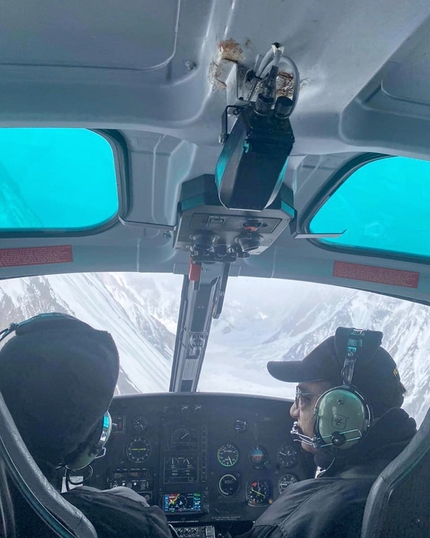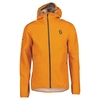About Tamara Lunger and K2 in winter

 1 / 20
1 / 20 archivio Tamara Lunger
archivio Tamara Lunger
How is Tamara Lunger doing? How is the mountaineer feeling, after having lost 5 friends and climbing partners on K2? For those who survive, it’s often like having to climb an entirely different mountain. Completely within themselves. Almost like a descent into the very depths of one’s soul. And it makes no difference if you’re a pro mountaineers, you’re never ready for it. It doesn’t suffice to know that all this might happen. It is not even enough to be one of the very best, one of the strongest. And it goes without saying that all this happened while attempting to climb one of the hardest mountains in the world in winter. A colossal undertaking, in conditions that were absolutely prohibitive. In short, words fail to describe what goes on in someone’s mind after enduring such an ordeal.
It seems as if Tamara wishes to convey all her bewilderment, as well as all her immense pain. And she does so in her style, sharing everything she feels inside her, no holds barred, without restraint. Tamara hasn't changed. And so, rather than a press conference during covid times, her outpouring seems lucid and crystal clear. She, currently quarantined up in her backyard mountains, is like a river in flood. And at times it almost fells as if she is talking to herself.
She talks about Sergi Mingote’s accident as if it were a film. She was already at Advanced Base Camp. Sergi was still higher up on the mountain and was descending to Camp 1. Then his fall, the screams. Tamara saw everything and, immediately, she also sensed the unspeakable. Especially when they reached him and realised that, with those injuries, there was no hope. They summoned their courage, kept him company. For over an hour they stayed with him. Talked to him. Then it took another 4 hours to prepared and transport his body back to Base Camp. Absolute agony. A terrible blow. Also organising his gear at Base Camp. And evacuating the lifeless body of a friend with whom she had shared joys and hardships until just the day before. It was extremely tough.
In the meantime, during those very same hours, the incredible Sherpa-Nepalese team celebrated the historic first winter ascent of K2. An achievement that many have indicated as marking a watershed moment in the history of the 8000ers. Because of the indisputable accomplishment, but also and above all because of its symbolic value: after 80 years of accompanying Western "Sahib" mountaineers, Sherpas had finally written a new page in high altitude Himalayan mountaineering.
So, down at base camp, joy and sorrow coexisted. Tamara celebrated the Nepalese endeavour, honouring the team’s "brutal" effort and incredible achievement. Yet the joy about that huge undertaking clashed with her profound sadness. In an instant all of Tamara's enthusiasm, all her desire to reach the summit, were faced with the harsh reality. While at the same time, new projects were being hatched at base camp, for Juan Pablo Mohr, Muhammad Ali Sadpara and John Snorri were already planning a new attempt.
It was only natural for Tamara to consider this her team. Juan Pablo JP, the Chilean, her extremely strong tent companion, had already been to 7000 meters. For Tamara he was certainly one of the strongest climbers she had ever seen climbing in the Himalayas. Ali was her climbing partner during the first winter ascent of Nanga Parbat (with Moro and Txicon). A hero in Pakistan. John for his part was well-trained and very strong. All were highly motivated, perhaps also due to the sudden and, in some ways, unexpected success of the Nepalese. They want the summit. And Tamara believes an attempt can be made. Although she is careful not to delude herself too much, because up until then she had only reached 6600 meters. In any case, in that base camp teeming with mountaineers, some debatable even and without any solid mountaineering background whatsoever, this was her only chance.
And so they set off. It’s hard right from the outset, terribly so. Each step is an undertaking in its own right. It seems as if the mountain resists with unnatural power. Compared to the winter ascent on Nanga Parbat, this is a completely different ballgame. Over there it was hard, yes, but every step was a discovery, a moment of joy. They were riding on enthusiasm. Here though, on K2, Tamara feels out of place. It's not her moment, she senses it. The mountain does not want her. Despite feeling exhausted, she tries to listen to her inner voice, understand what she should do. She is extremely cold. At base camp temps had dropped to -35°C. More or less the same temperatures she had faced up at Camp 4, at 8000 meters, when she reached the summit of K2 in summer 2014. Now though, between Camps 2 and 3, the thermometer has sunk to 60°C below zero. And she can no longer feel her feet. She believes she feels the cold most, but all the others are in the same condition.
The climb becomes harder and harder. She feels the game is over, for her. She also knows that they won’t manage to establish Camp 4, which she considers absolutely essential in order to reduce the risk a little. The almost certain alternative is a descent from the summit to Camp 3, an unimaginable gamble at that altitude. So, while climbing up to Camp 3, she makes a decision. She says goodbye to JP, turns around and starts descending. It is Ali, on his way up, who convinces her to try again. Come on Tamara, he tells her, at C3 you can rest and recharge your batteries. And, says Ali, it's too late to go down alone. She lets herself be persuaded.
She reaches Camp 3, but things don't change. Her violent cough continues, she doesn't eat and throws up what little she manages put into her mouth. So she crawls into her sleeping bag and huddles in a corner, so as not to disturb the others as they prepare for the summit. She’s decided: she’ll descend. She doesn't even try to convince JP to stay. Quite rightly so: he has a chance. JP reassures her, vows that if she ever wants to make another attempt later on, he will support her. It’s a huge promise, that illustrates what JP was like ...
It’s still night when they leave. Tamara sees the lights of their head torches disappear into the dark. She doesn’t know it, of course, but this is the last time she will see them. Much later she came to the conclusion that they summited. But, perhaps, they reached the top too late...
Meanwhile, while all this is happening, once again she must decide what to do. For a while she waits for news from JP: they’d agreed they would update via the GPS. But this doesn't happen. So Tamara decides to descend, but only after having prepared the tent and the basic necessities, some food, the stove and all the rest, for her climbing partner. Then she begins her descent. She is alone. It is cold and the clouds start to envelop Camp 3. It’s not an easy situation. She needs to go down, reach lower altitudes, get away from the paralysing cold and maybe join the other Seven Summits expedition members.
Down she goes. As fast as she can. But when he reaches the others, she is given yet more tragic news: Atanas Skatov, the Bulgarian mountaineer who had already climbed ten 8000ers, had fallen to his death. This is another terrible blow for Tamara. Her thoughts and tears go out to the mountaineer and man who, with his profound spirituality, had been the life and soul of Base Camp. It seemed as if, or at least she really was beginning to perceive, that the mountain did not want her. "It seemed as if K2 was sreaming at me to get out of there." Everything seemed to be going wrong. An absolute nightmare. Fleeing from the mountain becomes even more urgent. She has to descend, but also be even more careful. Every step, every maneuver, has to be absolutely perfect. She has to check the ropes. Cannot afford even the slightest mistake.
This is how she reaches the glacier, at night. Tamara has no head torch. The Irish mountaineer who is with her has only one, and it produces a dim light that looks like a candle. The route down to Base Camp has some dangerous sections. They climb below the stars. The most beautiful Tamara has ever seen. And as they do so, they get lost and wander around through the ice. Then intuition leads them in the right direction. They have roamed for 5 hours.
At one point, far away in the distance, they see the light of a torch. Tamara is sure it’s JP following them. She calls him. He replies... He looks just like JP. But it’s not to be. Two days later Ali, John and JP are still up on the mountain. Tamara senses it, comprehends that there is no more hope. Once again, after Nanga, she made the right decision, this time though her climbing partners will never return. She feels "almost dead inside". Now Tamara's story seems to look far into the distance. It’s almost as if it becomes detached from the facts and takes on another dimension.
"Even in its brutality I extremely grateful to have experienced all this, and to have been able to meet these beautiful people. I want to keep their spirit within me and continue like this for a bit… Because you can’t do anything else but do what you love." All that can be done now is "Cry when there is a need to cry, and give myself time to heal."
by Vinicio Stefanello
Link: www.tamaralunger.com, www.sportsandbeyond.it, La Sportiva, Camp Cassin, Garmin



 Copia link
Copia link



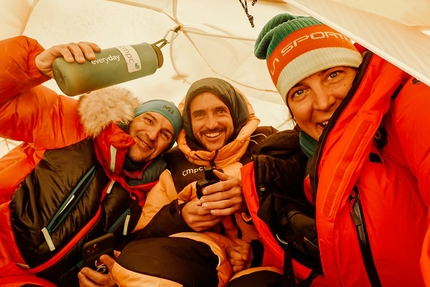

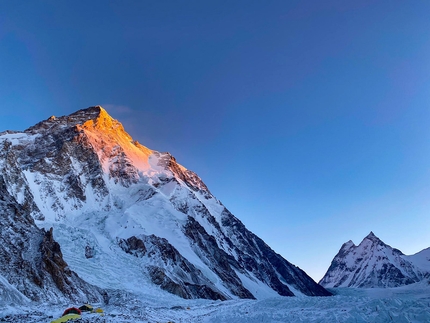
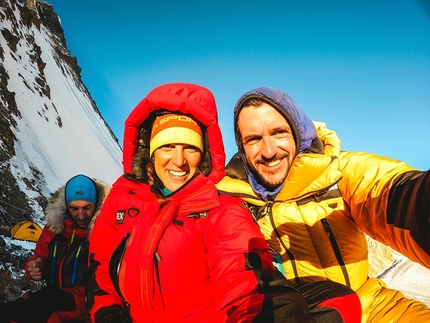


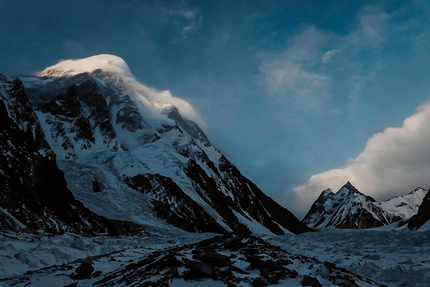









 See all photos
See all photos